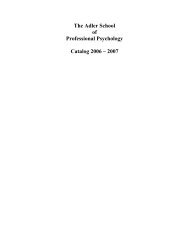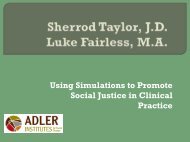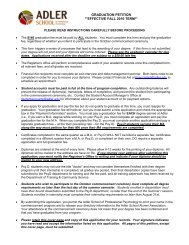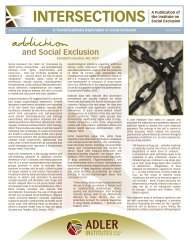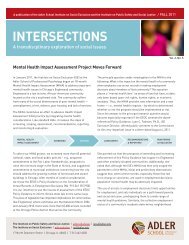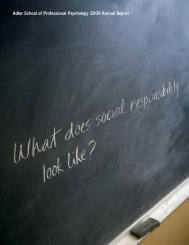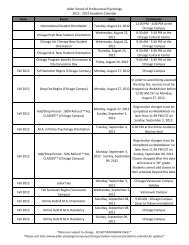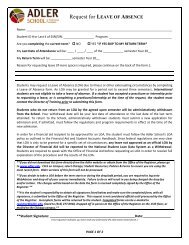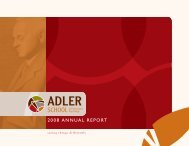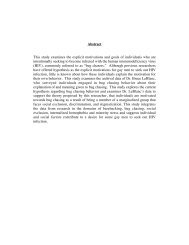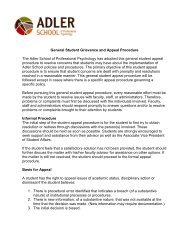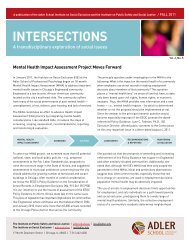Adler School of Professional Psychology Catalog 2008 – 2009
Adler School of Professional Psychology Catalog 2008 – 2009
Adler School of Professional Psychology Catalog 2008 – 2009
You also want an ePaper? Increase the reach of your titles
YUMPU automatically turns print PDFs into web optimized ePapers that Google loves.
models <strong>of</strong> psychotherapy (i.e., late Ego <strong>Psychology</strong>, traditional Object<br />
Relations, Self <strong>Psychology</strong>, Interpersonal psychotherapy) that focus on<br />
intrapsychic dynamics in the conceptualization <strong>of</strong> psychopathology and the<br />
treatment process. Contemporary versions that <strong>of</strong>fer an understanding <strong>of</strong><br />
diversity, including the role <strong>of</strong> culture, race, gender, and sexual orientation will<br />
be covered.<br />
335 Cognitive-Behavioral Approaches to Intervention 3 Credits<br />
Prerequisites: 472, 520 (Applies to M.A. students only). This course will focus<br />
on the analysis <strong>of</strong> the relationship between thoughts, feelings, and behaviors,<br />
and how to intervene to help clients. Experiential exercises, such as role-play<br />
and self-treatment projects, will facilitate student learning. The course will focus<br />
on outpatient populations with depression, anxiety, and other common<br />
psychological disorders. By the end <strong>of</strong> the class, students will have tangible<br />
skills to help clients to think more positively, feel better, and change their<br />
behaviors.<br />
336 Humanistic/Existential Approaches to Intervention 3 Credits<br />
Prerequisites: 472, 520 (Applies to M.A. students only). Major theories in the<br />
humanistic and transpersonal schools <strong>of</strong> psychology are reviewed including<br />
existential theory, Carl Rogers, Abraham Maslow, Stanislaf Gr<strong>of</strong>, and Ken Wilber.<br />
The integration <strong>of</strong> psychology and spirituality will be a particular focus <strong>of</strong> the<br />
class. In addition to examining how these perspectives inform individual<br />
psychotherapy, their applications to resolving social problems and promoting<br />
socially engaged practice will also be discussed.<br />
337 Group Psychotherapy 3 Credits<br />
Prerequisites: 472, 520 (Applies to M.A. students only). The history, theory,<br />
methods, and applications <strong>of</strong> group psychotherapy are examined, discussed,<br />
and demonstrated. The development <strong>of</strong> competency in group methods is<br />
enhanced through didactic presentation, role-playing, and participation in an<br />
ongoing group. The class meets as a group in an unstructured format. Students<br />
process their experiences in the here and now. The aim is to help students<br />
become more comfortable with themselves, and therefore learn to relate more<br />
effectively and creatively in the group setting.<br />
338 Child and Adolescent Psychotherapy 3 Credits<br />
Prerequisites: 472, 520, 623 (Applies to M.A. students only). The purpose <strong>of</strong><br />
this course is to provide a conceptual framework for interventions with children<br />
and adolescents. The course will focus on interventions and research on the<br />
major psychotherapeutic approaches for children and adolescents, including<br />
psychodynamic, <strong>Adler</strong>ian, person-centered, cognitive-behavioral, family<br />
systems, and parent-infant psychotherapy. The importance <strong>of</strong> addressing<br />
ethical, legal, and advocacy issues will be emphasized. Differences and diversity<br />
111



